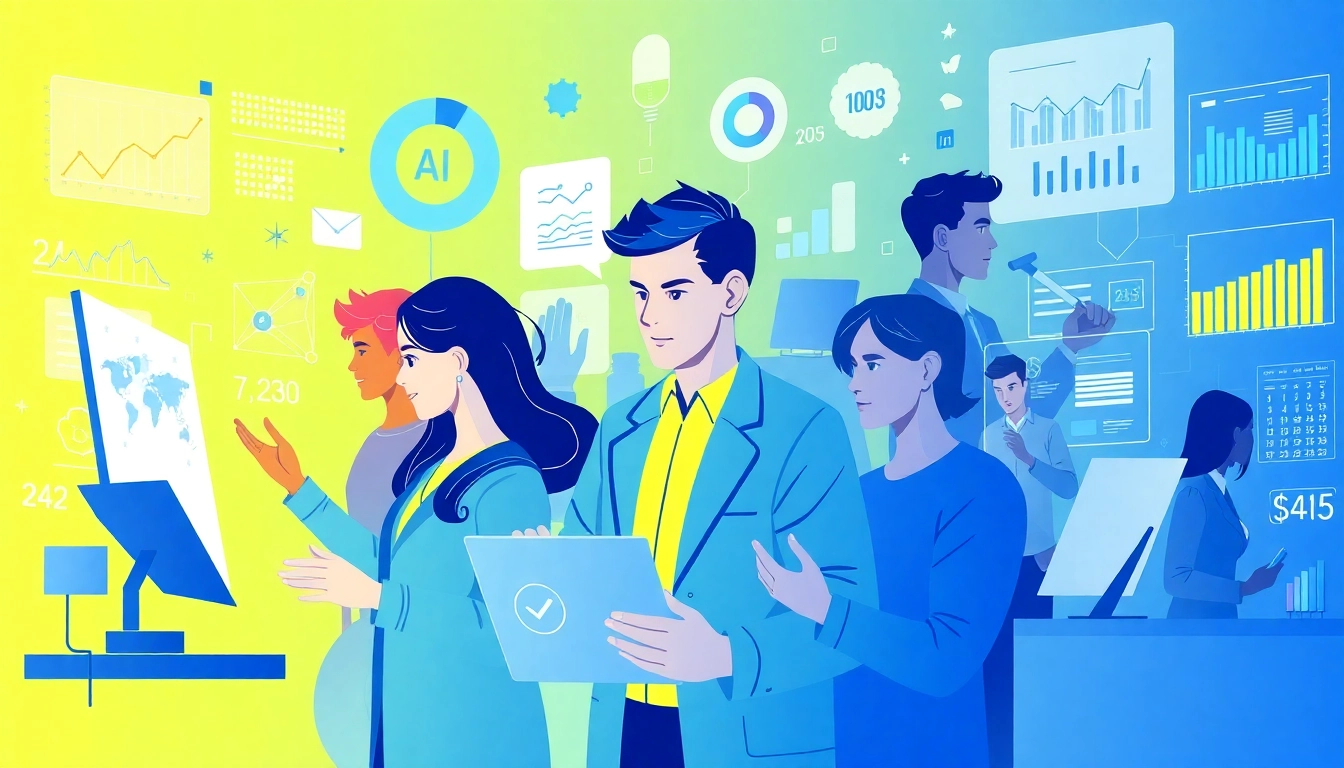Harnessing AI Marketing Agents: Boost Your Campaigns with Intelligent Automation
Introduction to AI Marketing Agents
As the digital landscape evolves, so do the tools available to marketers. One of the most transformative innovations in recent times is the rise of AI marketing agents. These advanced software solutions leverage artificial intelligence to automate and optimize various marketing tasks, offering significant benefits in efficiency and effectiveness. This article delves into what AI marketing agents are, how they work, and the immense value they can bring to marketing strategies.
What Are AI Marketing Agents?
AI marketing agents are software tools designed to automate specific marketing tasks by utilizing artificial intelligence technologies. Unlike traditional marketing tools that require heavy human input, AI agents can analyze data, conduct real-time performance tracking, and even execute marketing strategies with minimal oversight. They embody a hybrid of autonomy—as they operate independently on certain functions—and collaboration, as they still rely on human marketers to set objectives and refine strategies.
Benefits of Using AI Agents in Marketing
Integrating AI marketing agents into your marketing strategy offers several compelling advantages:
- Increased Efficiency: Automating repetitive tasks such as email segmentation, social media posting, and data analysis frees up valuable time for marketers to focus on creative and strategic planning.
- Enhanced Personalization: AI agents can analyze consumer data to deliver personalized content and recommendations, leading to improved engagement and conversion rates.
- Data-Driven Decision Making: With their capacity for data analysis, AI agents provide actionable insights that help marketers make informed decisions quickly.
- Cost Reduction: By streamlining processes and reducing the need for extensive manpower, businesses can lower operational costs while increasing output.
Key Features of Effective AI Marketing Tools
When selecting AI marketing agents, it’s essential to look for specific features that enhance their effectiveness:
- Real-Time Analytics: The ability to track and analyze campaign performance in real-time allows marketers to adjust strategies instantaneously.
- Machine Learning: Agents equipped with machine learning capabilities can improve their performance over time based on data patterns and user interactions.
- Integration Capabilities: Effective AI tools need to seamlessly integrate with existing marketing platforms, such as CRM systems, to ensure a smooth workflow.
- User-Friendly Interface: A straightforward interface minimizes the required training time and allows marketers of all skill levels to use the tool effectively.
How AI Marketing Agents Work
Understanding Automation in Marketing Tasks
Automation is the backbone of AI marketing agents. These tools utilize algorithms to manage marketing activities ranging from lead generation to customer engagement. Tasks that were once time-consuming and manual can now be executed with automated workflows, which increases productivity and reduces the likelihood of human error. For instance, an AI agent can automate email marketing campaigns by segmenting lists based on user behavior, sending personalized messages, and even adjusting email send times for optimum engagement rates.
The Role of Data Analytics in AI Marketing
Data analytics forms the core of AI marketing agents. By harnessing big data, these agents can extract insights from vast amounts of information that travel through various marketing channels. AI marketing tools identify trends, customer preferences, and market dynamics, enabling businesses to tailor their marketing messages effectively. For instance, analyzing click-through and conversion rates allows the AI to optimize content delivery timing, catering to when users are most likely to engage.
Real-Time Decision Making with AI Agents
One of the most significant advantages of AI marketing agents is their capacity for real-time decision-making. By analyzing data as it comes in, these tools can promptly adapt marketing strategies to changing consumer preferences or market conditions. For example, if an AI tool notices a spike in inquiries about a particular product, it can trigger automated responses, adjust ad spend on channels yielding high engagement, or even recommendations on associated products based on browsing histories.
Selecting the Right AI Marketing Agent
Assessing Business Needs and Goals
Selecting an AI marketing agent should begin with a clear assessment of business needs and objectives. Each organization has unique requirements based on its industry, customer base, and marketing goals. Businesses must identify key areas where AI can supplement their marketing efforts, whether increasing efficiency, enhancing customer segmentation, or fostering higher engagement rates.
Comparing Popular AI Marketing Tools
There is a plethora of AI marketing tools available, each boasting varying features and capabilities. Comparison should include:
- Cost: Evaluate subscription plans versus the features offered to ensure the best return on investment.
- Integration: Analyze how well the tool integrates with existing systems and the support available for implementation.
- User Reviews: Feedback from current users can provide perceptive insights into a tool’s effectiveness and reliability.
- Scalability: Choose tools that can grow with your business, accommodating increased marketing demands over time.
Integrating AI Agents into Existing Workflows
Efficient integration of AI marketing agents into existing workflows is crucial for maximizing their benefits. Businesses should consider the following steps:
- Training: Invest in comprehensive training programs to educate staff members about maximizing the capabilities of new AI tools.
- Pilot Programs: Initiate pilot programs to test the efficiency and functionality of the chosen AI agent before full deployment.
- Collaborate with Teams: Encourage collaboration between marketing teams and AI tool developers to customize features that meet specific team needs.
Best Practices for Maximizing AI Marketing Agents
Setting Clear Objectives
Establishing clear objectives is fundamental to maximizing the potential of AI marketing agents. Goals should be SMART—specific, measurable, achievable, relevant, and time-bound. This framework helps guide the AI tool’s configuration and ensures that the strategies employed align with broader business aspirations.
Monitoring Performance Metrics
Continuous monitoring of performance metrics is essential for diagnosing effectiveness and making data-driven adjustments. Marketers should focus on key performance indicators (KPIs) such as:
- Click-Through Rates: Measure the percentage of users that click through to landing pages or offers.
- Conversion Rates: Track how many leads convert into actual customers as a result of AI-driven campaigns.
- Engagement Rates: Assess levels of interaction on social media platforms and email campaigns.
- Return on Investment: Calculate the revenue generated against the expenditures on AI marketing tools.
Regularly Optimizing AI Tools
AI technology is fast-evolving, which means it is paramount to regularly optimize the tools employed. This can involve:
- Feedback Loops: Establishing mechanisms for collecting feedback from users on a regular basis can guide adjustments and improvements.
- Updating Algorithms: Regular updates can ensure that the AI agents utilize the most effective algorithms based on current data and trends.
- Continuous Learning: Implementing a strategy where the AI tool learns from previous campaigns to produce better outcomes over time can lead to sustained improvements.
Future Trends in AI Marketing
The Evolving Role of AI in Marketing
The role of AI in marketing is set to expand significantly over the coming years. As technology advances, AI agents will adopt more sophisticated capabilities such as predictive analytics, allowing for enhanced forecast accuracy about consumer behaviors and market trends. This evolution will result in more strategic, proactive marketing initiatives that cater to evolving consumer expectations.
Predictions for AI Marketing Agents
Experts predict that the future will see AI marketing agents becoming integral components of marketing agencies. With advancements in natural language processing and machine learning, these tools will provide unprecedented personalization and responsiveness. Expect an increase in AI-driven customer service chatbots, deeper integrations across digital platforms, and fully automated marketing campaigns that continuously adapt to consumer needs.
Preparing for the Future of Digital Marketing with AI
Businesses that invest in AI marketing agents now will stand to benefit significantly in the future. Preparing for this shift includes:
- Staying Informed: Keeping abreast of technological advancements in AI will help companies navigate the rapidly changing landscape.
- Investing in Training: Equipping marketing teams with the necessary skills to work alongside AI tools will enhance team efficiency.
- Building Flexible Strategies: Creating adaptable marketing strategies that can easily integrate new insights and tools will position businesses for success.



